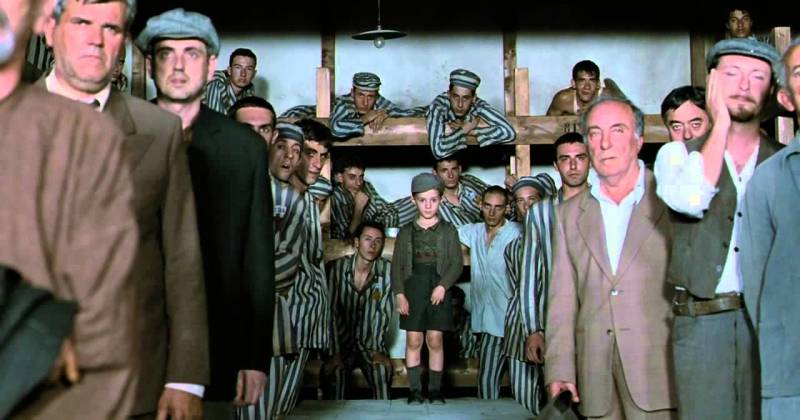Life is Beautiful (1997)

Directed by Roberto Benigni and released in 1997, “Life is Beautiful” (original title: “La vita è bella”) is a poignant and uplifting film that blends comedy and tragedy to tell a story of hope and survival during the darkest times of human history. Set against the backdrop of World War II, the film follows the journey of Guido Orefice (played by Roberto Benigni), a spirited Jewish-Italian man, as he uses his humor and imagination to shield his young son from the horrors of a Nazi concentration camp.

The narrative of “Life is Beautiful” unfolds in two distinct parts. The first part introduces viewers to Guido, a charming and resourceful man who arrives in a small Tuscan town to work in his uncle’s hotel. Through a series of whimsical and comedic events, Guido falls in love with Dora (played by Nicoletta Braschi), a schoolteacher engaged to a Fascist official. Guido’s playful and persistent pursuit of Dora, depicted with comedic flair and tender sincerity, sets the stage for their unconventional romance amidst the looming shadows of war.
![REVIEW] THE PIANIST và LIFE IS BEAUTIFUL - số phận của những người Do Thái trong cuộc chiến mà họ không được chọn](https://wildsoundwritingfestivalreview.files.wordpress.com/2017/10/life-is-beautiful-1997.jpg?w=1038&h=576&crop=1)
The second part of the film takes a dramatic turn as Guido, Dora, and their young son Giosuè (played by Giorgio Cantarini) are captured and sent to a Nazi concentration camp. Determined to shield his son from the harsh reality of their circumstances, Guido uses his quick wit and imagination to create an elaborate game, convincing Giosuè that their internment is merely a complex competition to win a tank. Through humor, fantasy, and unwavering optimism, Guido transforms the grim reality of the camp into a hopeful narrative of survival and endurance.
Central to the film’s thematic exploration is the power of love and the resilience of the human spirit in the face of adversity. Guido’s unwavering devotion to his family, his ability to find moments of joy and laughter amidst despair, and his unwavering belief in the inherent goodness of humanity serve as a testament to the strength of the human spirit. The film’s poignant portrayal of parental sacrifice and the innocence of childhood innocence adds layers of emotional depth, resonating with audiences on a universal level.

“Life is Beautiful” is characterized by its blend of humor and pathos, seamlessly weaving lighthearted comedy with profound moments of introspection and emotional resonance. Roberto Benigni’s charismatic performance as Guido, for which he won the Academy Award for Best Actor, imbues the character with warmth, charm, and a deep sense of humanity. The film’s screenplay, co-written by Benigni and Vincenzo Cerami, strikes a delicate balance between laughter and tears, offering a nuanced portrayal of human emotions in the face of unimaginable circumstances.
Visually, “Life is Beautiful” is captured through evocative cinematography that juxtaposes the picturesque landscapes of Tuscany with the stark brutality of the concentration camp. The film’s use of color, light, and composition underscores its narrative contrasts, from the vibrant hues of pre-war Italy to the muted tones of the camp’s bleak interiors. These visual elements not only enhance the film’s emotional impact but also underscore its thematic exploration of hope, resilience, and the enduring power of the human spirit.

Thematically, “Life is Beautiful” challenges viewers to confront the atrocities of history while celebrating the triumph of love and compassion. Guido’s ability to find beauty and meaning in the midst of suffering serves as a poignant reminder of the resilience of the human spirit and the transformative power of laughter and imagination.
In conclusion, “Life is Beautiful” is a timeless masterpiece that continues to resonate with audiences worldwide for its profound message of hope, love, and the indomitable human spirit. Through its blend of comedy and tragedy, Roberto Benigni’s visionary direction, and a standout performance, the film leaves a lasting impression as a testament to the enduring power of optimism and the belief that even in the darkest moments, life can still be beautiful.











